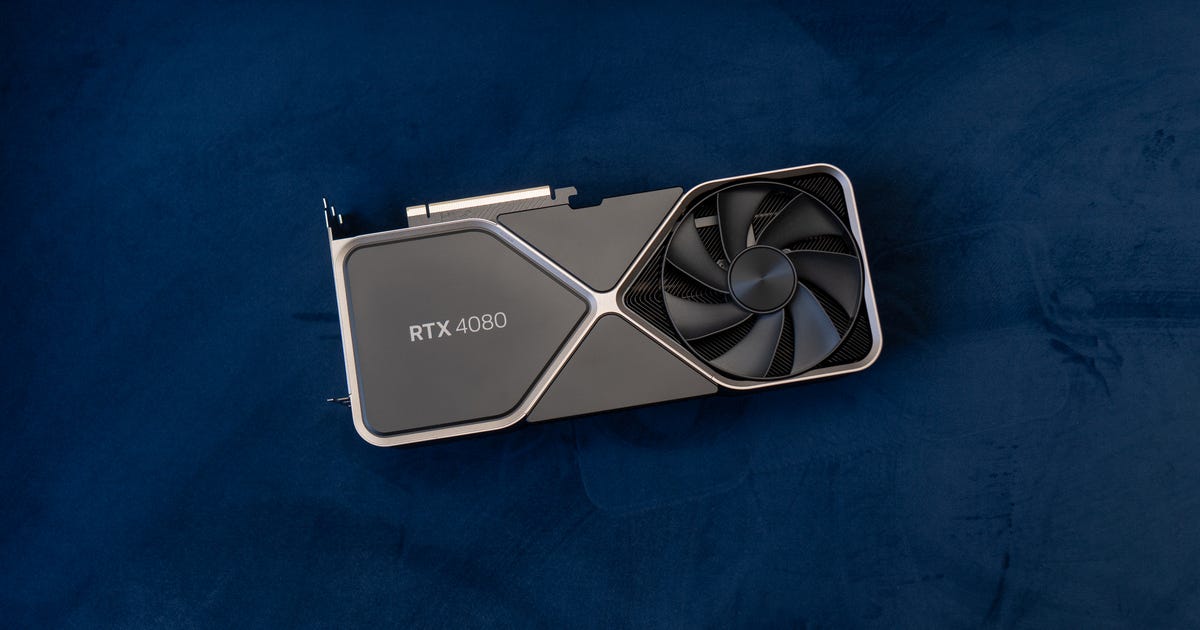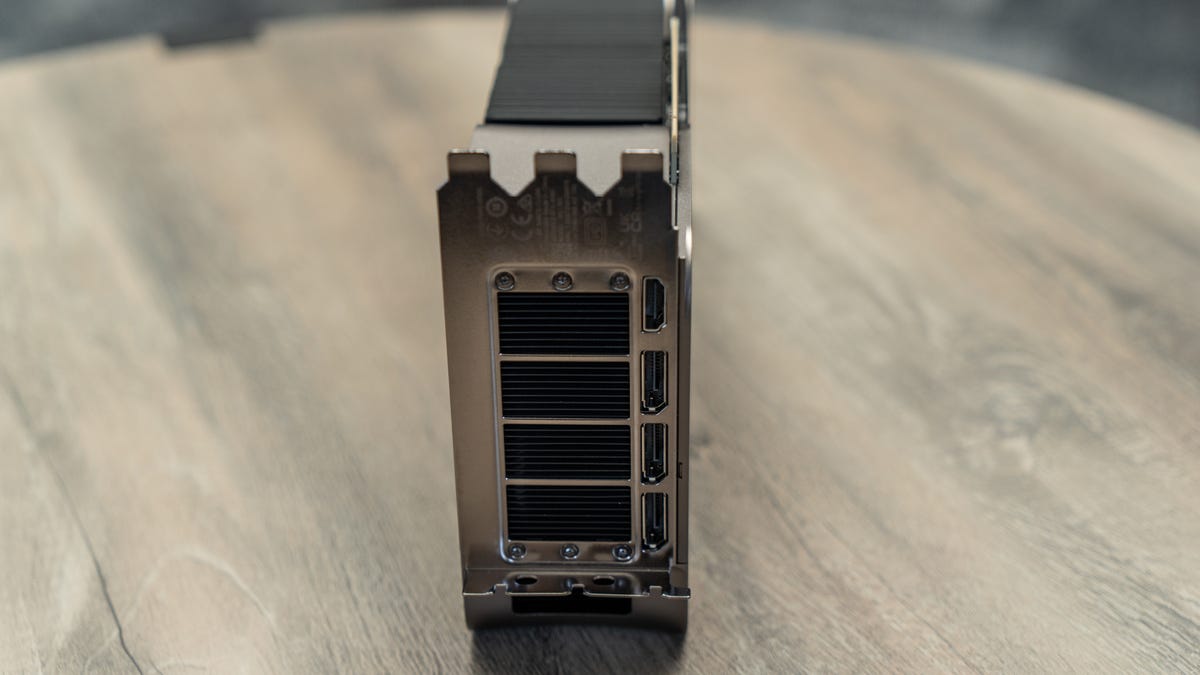
Though the Nvidia GeForce RTX 4090
may be the first flagship of the company’s Ada Lovelace-architecture gaming GPU line, the step-down RTX 4080 should attract more potential buyers, if only because its $1,200 price tag is $400 lower than the 4090’s (though that will vary by board manufacturer). And if you want to save money but still get solid 4K gameplay or smoother streaming out of your graphics card, the RTX 4080 is definitely your best bet — for the moment.
A lot depends upon how well AMD’s newest RDNA 3-architecture RX 7900 XTX performs (or the 7900 XT at $899), since it will directly compete with the RTX 4080 at a lower $1,000 figure. We won’t know that until mid-December, though, since that’s when it’s expected to ship. And the rest of the RTX 40-series, from the RTX 4070 down, remains somewhat of a mystery; if the “unlaunched” 12GB model of the RTX 4080 indeed becomes the RTX 4070, I’d place that as a top-end 1440p card or bare-bones 4K.
Like
- Really fast
- Lifts performance of everything, not just games and applications that specifically support the new algorithms
- Relatively quiet
Don’t Like
- Big
- Relatively expensive
- Using the power adapter requires more clearance than you might have
In fact, the RTX 40 series thus far seems to be a notable leap over the 30 series, not just in frame rates but in ray tracing and latency performance improvements, as well as improved performance consistency in general. Enough of a leap that if you’re on the fence about upgrading from a 30 series card, it might tip you into the greener pasture. (Here’s a summary of all the updates the 40 series brings to the line.)
But it might merit waiting if you need to save even more or aren’t quite set up for 4K gaming — you really want a powerful CPU and system with a high-bandwidth (PCIe 4 or later) GPU slot, not just a 4K monitor, or you won’t get as much out of the new GPU as you’d expect. The two 40-series cards I’ve tested are not only faster with significantly lower latency, but they also seem to rely on the CPU far more than the 30 series.
Nvidia GeForce RTX 4080 Founders Edition specs
| Memory | 16GB GDDR6X |
|---|---|
| Memory bandwidth (GBps) | 716.9 |
| Memory clock (GHz) | 11.2 |
| GPU clock (GHz, base/boost) | 2.21/2.51 |
| Memory data rate/Interface | 22Gbps / 256-bit |
| RT cores | 76 |
| CUDA cores | 9,728 |
| Texture mapping units | 304 |
| Streaming multiprocessors | 76 |
| Tensor Cores | 304 |
| Process | 4nm |
| TGP/min PSU | 320W / 750W |
| Max thermal (degrees) | 194F/90C |
| Bus | PCIe 4.0×16 |
| Size | 3 slots; 12.0×5.4 in. (304x137mm) |
| Launch price | $1,200 |
| Ship date | Nov. 15, 2022 |
And if you’re upgrading from an RTX 3080 Ti, you might even need a new case to fit the RTX 4080. The latter is a three-slot card, longer and higher than the former — in fact, it’s the same size as the RTX 4090. Since it’s higher, if you’re using the three-headed power adapter, there needs to be sufficient clearance to keep it from bending too much near the connector. There have been isolated reports of, well, melting.

The RTX 4080 is as fat as the RTX 4090, which is the same size as an Xbox Series S.
Lori Grunin/CNET
For gamers who use DLSS, the card still delivers a lift in DLSS 2 as well as an even better bump with DLSS 3. For games that support the latter, if you run in Performance mode on the RTX 4080 it can deliver the same frame rate as the RTX 4090 in Quality mode, though whether the drop in quality (if there is one) depends upon the game, your visual acuity and how much you care. It’s definitely a tradeoff to consider if you’re on a budget.
Only 10 games with DLSS 3 support are available as of the launch of the RTX 4080:
- A Plague Tale: Requiem
- Bright Memory: Infinite
- Destroy All Humans! 2 – Reprobed
- F.I.S.T.: Forged in Shadow Torch
- F1 22
- Justice
- Loopmancer
- Marvel’s Spider-Man Remastered
- Microsoft Flight Simulator
- Super People
Of course that number will grow over time, but until it does, you still need to think about DLSS 2 performance.
Pending formal encoder testing, I can say that it seems like the AV1 encode/decode bump makes a difference, at least in OBS (one of the few applications that have thus far added support, since it requires the use of a different Nvidia codec) where it handled recording a stream well enough in 4K. But it’s early days, and it can be persnickety about the settings to do so successfully. Not a deal-breaker, but an annoyance. DaVinci supports them, but as yet Adobe Premiere Pro doesn’t seem to. For 3D-based pro graphics applications, at least as measured by SpecViewPerf 2020, there are the usual generational and 4090-over-4080 performance differences.
While the RTX 4080 isn’t as fast as the RTX 4090 with all the stops pulled out, nor would you expect it to be, on a lot of games where the shiny and the detail are more important than speed, the RTX 4080 should do them justice in 4K for less cash. Whether or not it’s the best deal out there for the job may change over the next couple of months, as AMD ships and CES announcements arrive.
Relative performance of recent GPUs
Shadow of the Tomb Raider gaming test (4K)
Note:
Longer bars indicate better performance (FPS)
3DMark Fire Strike Ultra
Note:
Longer bars indicate better performance
SpecViewPerf 2020 SolidWorks (4K)
Note:
Longer bars indicate better performance (FPS)
3DMark Speed Way (DX12 Ultimate)
Note:
Longer bars indicate better performance
3DMark DXR (DirectX Ray Tracing)
Note:
Longer bars indicate better performance (FPS)
3DMark DLSS
DLSS 2, Quality, RTX 4080
DLSS 3, Quality, RTX 4080
DLSS 2, Quality, RTX 4090
DLSS 2, Performance, RTX 4080
DLSS 3, Quality, RTX 4090
DLSS 3, Performance, RTX 4080
DLSS 2, Performance, RTX 4090
DLSS 3, Performance, RTX 4090
Note:
Longer bars indicate better performance (FPS)
Test PC configuration
| Custom PC | Microsoft Windows 11 Pro (22H2); 3.2GHz Intel Core i9-12900K; 32GB DDR5-4800; 2x Corsair MP600 Pro SSD; Corsair HX1200 80 Plus Platinum PSU, MSI MPG Z690 Force Wi-Fi motherboard, Corsair 4000D Airflow midtower case |
|---|
